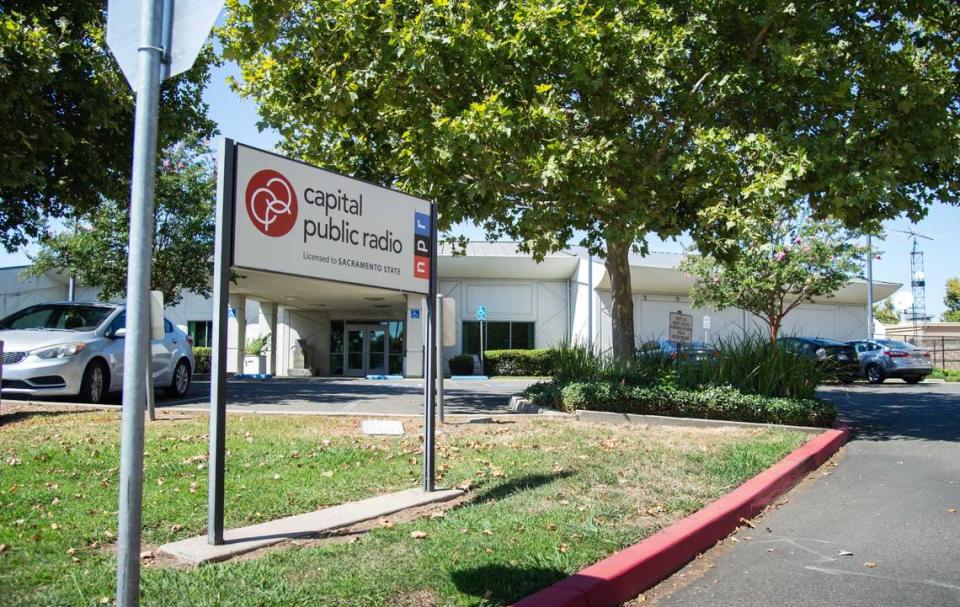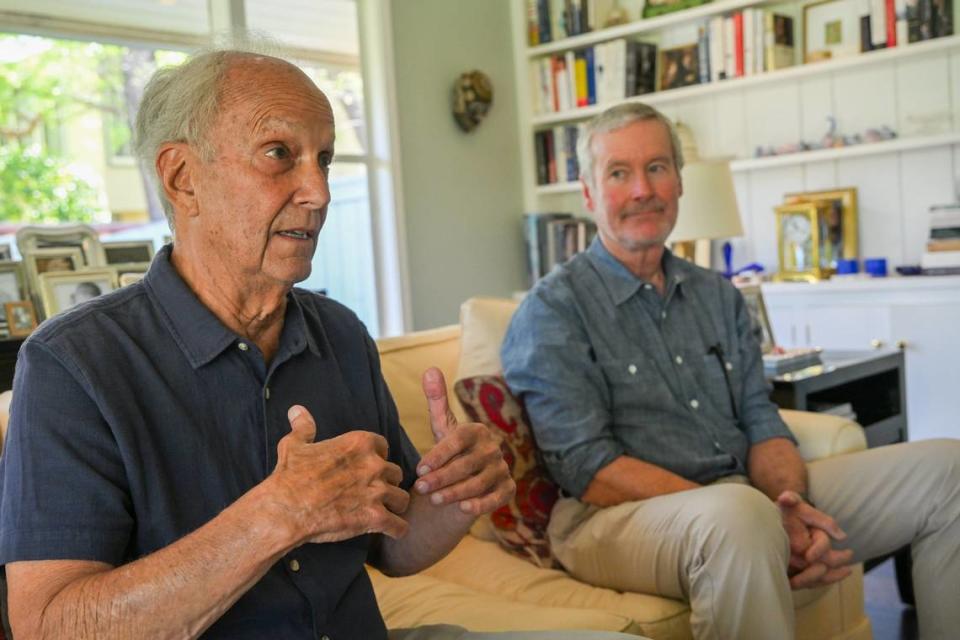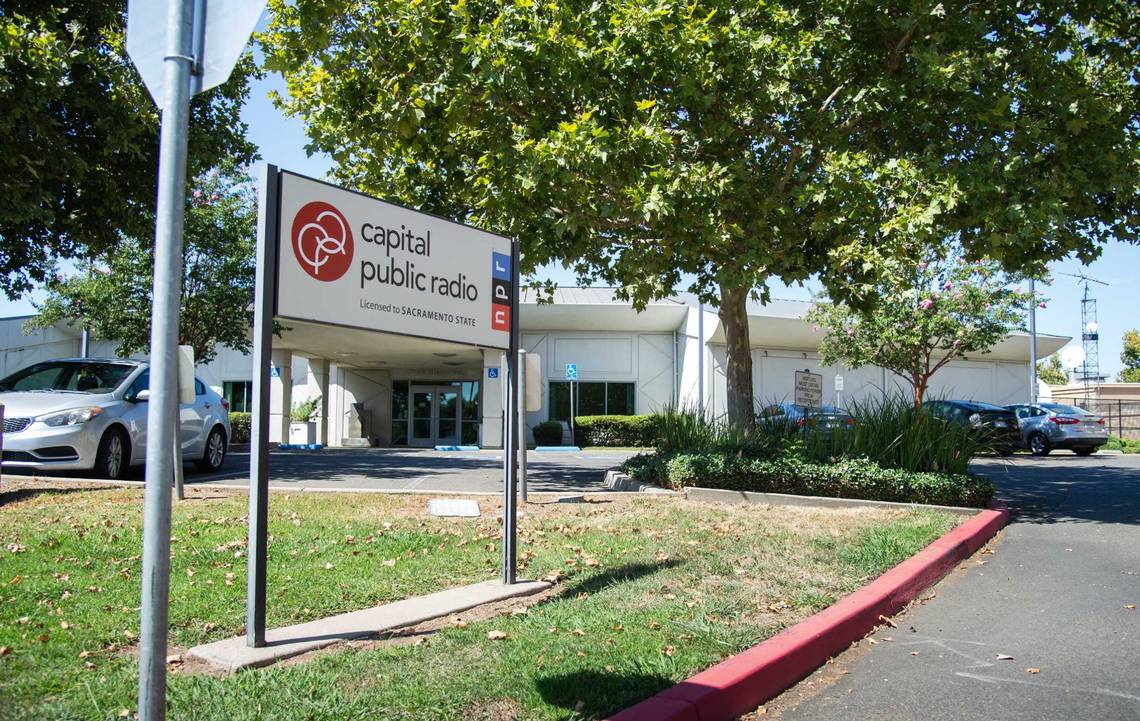The request to California State University, Sacramento, President Luke Wood came Wednesday in a letter from the Capital Public Radio Endowment board, which provides financial support to CapRadio and contends a merger with KVIE would relieve Sac State of financial obligations and restore faith with members of the public who have donated to the troubled radio operation.
“We, as major donors, along with a host of other CapRadio major donors and commercial supporters, strongly believe that the best future for CapRadio lies in an integrated public media platform with KVIE, our community’s public television station,” the endowment wrote to Wood in the four-page letter.
But there are no signs that Sac State is willing to end its stewardship of CapRadio, the NPR affiliate that has been buffeted by what Wood called “total financial mismanagement” after the release of a scathing California State University audit last year.
Sac State says its committed to CapRadio
The endowment board complained in its letter that Sac State has refused to discuss such a plan, writing that because “the CSUS leadership team has repeatedly refused to respond to our telephone calls, emails and requests for meetings, this letter became necessary.”
A Sac State spokesman confirmed the university had received the letter — which he said contained “multiple inaccuracies” that he did not identify — and said late Wednesday that officials were willing to meet with KVIE General Manager and President David Lowe “to discuss issues of mutual interest.”
But spokesman Brian Blomster gave no indication the university was looking at relinquishing control of Cap Radio, saying Sac State “remains committed to public broadcasting and to our auxiliary CapRadio, which is the Northern California voice of National Public Radio.”
“The university continues to consider options as part of our overall assessment of how best to deploy CapRadio resources while serving its operational needs, and its listeners and supporters,” Blomster said. “Independent of debt incurred by CapRadio during the past few years, the organization’s operations are sound, and we are working with CapRadio management to further ensure its financial strength.”
Sacramento State owns the broadcast license for CapRadio stations KXJZ-FM (90.9) and KXPR-FM (88.9). CapRadio also operates North State Public Radio, which has two stations owned by Chico State.
The endowment suggests that selling the license to KVIE “is a ‘win-win-win’ for the campus, the station and the community.”

“The campus can get much of what it wants in terms of programming presence and student engagement, while shedding future station operational expenses,” the endowment wrote. “Further, the sale of the licenses to KVIE will bring CSUS/CSU significant funds to credit against its station subsidies since takeover in August 2023.
“It also releases CSUS staff from continuing to deal with the CapRadio problem and future CapRadio operating expenses.”
The audit released last year pinned CapRadio’s financial problems on lax management and an aggressive expansion plan to move CapRadio’s operations off campus to two buildings downtown that require monthly payments totaling nearly $125,000 by the conclusion of their 15-year leases.
CapRadio’s troubles led to layoffs and program cutbacks last year, as well as the mass resignation of members of CapRadio’s board of directors, which is separate from the CapRadio endowment board.
After the highly critical CSU audit was released, Sac State announced that it was assuming financial oversight of the operations, but leaving journalistic and programming decisions to station management.
Since then, the station has been run by interim managers and is seeking to hire a new permanent general manager. A new board of directors has been appointed, and Wood has lauded what he said has been an increase in listeners and memberships.
But members of the endowment board say they are concerned enough about the financial problems of CapRadio that they see a merger with KVIE as a way to ensure its future for Sacramento.
“This is an extremely important community asset, and we want to protect it,” endowment board chairman Dan Brunner said in an interview.
“Sacramento deserves this,” added endowment board member Buzz Wiesenfeld.


Endowment has $4M in assets, worried about tower
The activities of the Capital Public Radio Endowment have been criticized by CSU officials, who wrote in the financial audit that it was “an unauthorized endowment fund” that should have been run through the University Foundation, and that the endowment had failed to file timely audits of its operations.
Brunner and Wiesenfeld both pushed back on that stance Wednesday, saying the endowment has worked with CapRadio for decades and provides ongoing funding for the operation.
In the letter, the endowment board wrote that Sac State agreed to meet with the endowment leadership last fall and “reluctantly acknowledged our legal standing.”
“CSUS leadership insists that university rules, now, for the first time in over 20 years, prevent working with an entity such as ours,” the letter said, adding that the university has never been shy about collecting support from the endowment for CapRadio.
The letter says the endowment has more than $4 million in assets, including the KXJZ transmission tower and 36 acres it sits on in Elverta, and that it allows CapRadio to use the tower without charge — which it values at $65,000 annually.
The letter also noted that CapRadio is allowed to collect rental income of $126,000 each year from other tenants using the tower.
In addition, the board letter said the endowment makes annual gifts to CapRadio averaging $75,000 for programming support, and added that last fall it provided $425,000 “to solve an immediate personnel problem.”
(Sac State said that funding went to help hire three management positions.)
“CapRadio/CSUS appears happy to take CPRE funds, while refusing our longstanding history of on-air promotions and participation in this year’s Big Day of Giving, interfering with the shared and vital work of soliciting public donations,” the letter stated.
The endowment board noted that CapRadio is responsible for maintenance of the transmission tower, but said that in recent months the endowment “discovered significant deferred maintenance.”
“The list of items to be remedied includes generator replacement, guy-wire tensioning and corrosion repair, tower painting, installation of a new security system, pump repair and maintenance, weed and insect control, junk removal, radio frequency testing, and refitting a flood mitigation wall/door,” the letter states. “To date, the anticipated cost for these contracts is approximately $400K.
“We also discovered that the station/CSUS had not obtained property and flood insurance on behalf of CPRE and had not given us notice of that fact. Insurance placement was, of course, part of the multi-decade pattern and practice between CapRadio and CPRE for use of our tower.
“Including the cost of insurance and our consultants, we expect CPRE total expenditures on the tower to exceed $500K this calendar year. The station had the duty to maintain the tower under this arrangement, and had been doing so for years, especially since it was collecting all tower rental payments.
“Then, without notice to us, the station began deferring maintenance.”
The deferred maintenance and repairs are necessary for worker safety and for properly transmitting radio signals, the letter states.
“In spite of these facts, CSUS refuses to talk with us,” the endowment wrote in its letter. “This is a legal dilemma that will not last for much longer.”
KVIE: ‘We’re committed to a strong public media’
The endowment describes the solution as a merger with KVIE, a model that it says has been successful in markets in San Francisco, San Diego and Oregon, and one that “makes particular sense in the capital of California, a strategic location, the most populous state in the union and one of the largest economies in the world …”
“Financial economies of scale can be achieved, with cost savings in accounting, HR, marketing, through streamlined internal operations …” the endowment wrote. “The combination will be positively stimulating to the community of major donors, enhancing appeal to a combined and broader range of sponsors and ad agencies.
“This will also enhance attractiveness for government and private grants.”
Lowe, the KVIE president, said he had met with members of the endowment board and CapRadio previously to discuss the possibility of combining operations, but added that there have been no direct contacts with the Sac State president.
Lowe said there are examples in other major cities of the sort of combined operation the endowment is suggesting, and that KVIE would be interested in having more discussions about the possibility.
“We would need to talk about what the opportunities are,” Lowe said. “We’re committed to a strong public media, and that doesn’t have to include just ourselves.”
Brunner and Wiesenfeld, who both said they have made six-figure contributions to support CapRadio, said there is no set deadline for Sac State to respond to their proposal.
But they added that they believe it is important for talks to commence.
“What we’re interested in is encouraging a serious discussion,” Brunner said. “And the endowment has, in total, $4 million of assets that can be used to help facilitate the deal in some way.
“How that’s done is yet to be determined, but that is the attitude of the endowment board, is to use what we have to support the notion of an integrated public media operation in this area.”
